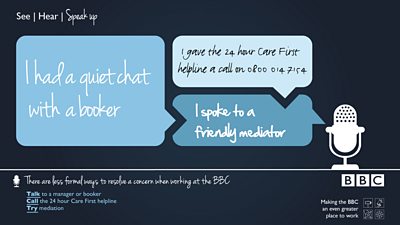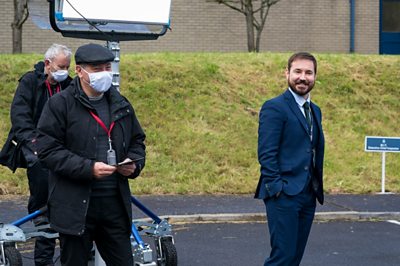Whilst working at the ΒιΆΉΤΌΕΔ we want you to be able to focus on producing the best quality work on our productions. We understand that there are things that we need to provide to allow you to flourish in your time with the ΒιΆΉΤΌΕΔ. As well as this, there are certain expectations that we have of you whilst you're working on one of our productions.
Support
Employee Assistance Programme (EAP) and Remote GP
PAYE freelancers can now access the ΒιΆΉΤΌΕΔβs Employee Assistance Programme (EAP) - provided by Carefirst - and services.
These confidential services offer a range of support, including telephone advice and counselling sessions, which we hope will be of benefit to you.
β’ EAP - if you're based in the UK call: 0800 042 0140, if you're based outside the UK call: 0044 1452 372 435
Email: bbcinternationaleap@care-first.co.uk - You can request an immediate call back.
or:
Access the using the login credentials:
Username: ΒιΆΉΤΌΕΔ
Password: EAP
β’ Remote GP - to book an appointment with a GP 24/7 call: 0345 222 3735 or
Film & TV charity support
Available for freelancers on both gross paid and PAYE contracts, you can find a range of free support and advice from our partners at the Film and TV charity, They offer confidential support lines, wellbeing resources as well as financial aid. Contact them or by calling 0800 054 0000
Speaking up / Raising a concern
We want the ΒιΆΉΤΌΕΔ to be a safe place for everyone that works here. At all times, we expect everyone, whoever they are, to behave in a respectful and inclusive way. Every individual should be treated equally regardless of their age, disability, sexuality, gender or gender reassignment, race, religion or belief, marital or employment status.
Bullying and harassment is behaviour that makes you feel intimidated or offended. We do not tolerate bullying or harassment; offensive behaviour or language is not acceptable under any circumstances.
Raising a concern
If you have a concern, please contact the person who engaged you in the first instance. Alternatively you can speak to your head of department, local HR contact or any of our leaders.
Please find the ΒιΆΉΤΌΕΔ Bullying and Harassment Policy attached for more detailed information about the support provided to everyone who works at the ΒιΆΉΤΌΕΔ.
Bullying and harassment helpline
You can access the , provided by Care First, online (username: bbcemployed, password: line1234) or by calling 0800 014 7154 (or +44 1452623367 outside of the UK).
They offer independent, confidential and practical advice and information to anyone who is experiencing bullying or harassment or has a concern about bullying or harassing behaviour.

Whistleblowing
Whistleblowing, or protected disclosures, are concerns made in the public interest and can relate to issues such as health and safety, malpractice or wrongdoing impacting on others including breaches of the law. If you have a concern about malpractice at work, you should raise it with the person who hired you, or your manager, if you feel you can. You can do this verbally or in writing.
External contacts
If you can't raise your concern internally, you should contact Navex Global, which is an external, anonymous, independent organisation.
You can call them on 0800 890 011. At the prompt, dial 833 573 1750.
If you are outside of the UK or wish to make a report in a language other than English, go here:
All information, except for your name (if you so wish), will be passed by Navex Global to our Director of Risk and Assurance or the Head of the Corporate Investigation Service.
Protect
If you want further independent advice, you can contact . They are an independent charity that specialises in providing free and confidential legal advice on how to raise a concern about serious malpractice at work.
Your protection
The Director-General and Senior Leadership team are committed to the principles of the Protected Disclosures (Whistleblowing) Policy.
Your position will not be at risk if you raise a genuine concern.
If you raise a matter that you know to be untrue, disciplinary action may be taken.
We will not tolerate any sort of victimisation of anyone raising a genuine concern and anyone responsible for doing so will be subject to disciplinary action.
You may raise your concern in confidence; you can ask for your identity to be protected.
External Organisations
There are various external organisations that offer a range of support to Freelancers working in the Film and TV industry. Please see details below.
Free, confidential B&H advice and support for our freelancer community. Contact them or by calling 0800 054 0000
This from ScreenSkills is designed to help you recognise and address harassment and bullying behaviours in yourself and others. It builds on the principles and zero tolerance guidelines developed with organisations across film, television and games industries by the BFI and BAFTA in 2018.
The Advisory, Conciliation and Arbitration Service (ACAS) supply up-to-date employee relations information, independent advice and high-quality training. They also work with employers and employees to solve problems. You can get free advice from their or by calling the helpline.
Provide free, independent, confidential and impartial advice on your rights and responsibilities via their , local bureau or by telephone. Resources are available on work issues including discrimination at work. Advice is also available on personal/ home life issues including money, benefits, relationships, housing, the law, tax, health and education.
The offers free phone and live chat services (from most landline/mobile providers) that provide information, advice and support on discrimination and human rights issues in England, Scotland and Wales. Also offer guidance on the Equality Act 2010, resolving workplace issues informally or formally, legal aid, and how to access other support services.
Websites of Government departments, agencies and public bodies. Policies, publications and statistics available including information on .
A national independent watchdog for work-related health, safety and illness. On their , they offer information on bullying or harassment.
A that provides advice and information on mental health issues and services to everyone in the UK. Also, offer useful information and resources on Adult Bullying.
provides information on different types of mental health problems, where to get help, medication and alternative treatments and advocacy. The legal advice service provides general advice on mental health law covering mental health, mental capacity, community care, human rights and discrimination/equality related to mental health.
to anyone currently or previously affected by harassment or stalking. They also advise on legal aspects, gathering evidence and how to report, ensuring personal safety and reducing risks. Calls are free from landlines and some mobile providers.
A that offers a confidential helpline for anyone suffering from emotional distress. It is staffed by trained volunteers.
54 of Britain's unions offering policy, research, training, lobbying, campaigning and worker representation. Information on also available.
on hate crimes and hate incidents relating to disability, race, religion, sexual orientation, or transgender identity. Hate crimes or hate incidents can be reported using their online form. Support is also available for victims
A offered by the TUC that provides information on workplace rights, pensions, health at work and your career. Information is available on workplace bullying and harassment.
Expectations
We have a unique role in audiencesβ lives: to inform, educate and entertain millions of people in the UK and around the world. To deliver this for all audiences, we aim to to attract and retain world-class, diverse talent and unite everyone behind a common set of values and behaviours.
ΒιΆΉΤΌΕΔ Values
As the worldβs most creative organisation, we are committed to being diverse, inclusive and sustainable: reflecting our audiences across the UK and globally, connecting with new generations and perspectives, and respecting our planet.
More than just words on a page, our values inform everything we do. They are the DNA of the ΒιΆΉΤΌΕΔ. Theyβ―set out who we are andβ―how we do things. They define what you can expect from the ΒιΆΉΤΌΕΔ, and what the ΒιΆΉΤΌΕΔ expects from you.
Working with you, weβve refreshed our values for our centenary year to help build a ΒιΆΉΤΌΕΔ that is creative, inclusive and full of opportunity. Where weβre all connected β β to our audiences and to each other.
- AUDIENCES are at the heart of everything we do
- CREATIVITY is the lifeblood of our organisation
- TRUST is the foundation of the ΒιΆΉΤΌΕΔ β weβre independent, impartial and truthful
- We RESPECT each other β weβre kind, and we champion inclusivity
- We are ACCOUNTABLE and deliver work of the highest quality
- We are ONE ΒιΆΉΤΌΕΔ β β we collaborate, learn and grow together
GDPR
The ΒιΆΉΤΌΕΔ is committed to protecting the privacy and security of your personal information.
Our ΒιΆΉΤΌΕΔ People Privacy Notice describes how we collect and use personal information about you during and after your working relationship with us, in accordance with the General Data Protection Regulation 2016/679 (GDPR). If you require further details as to how your personal data is processed, we ask that you refer to this document.
Additional information about how we use your personal information and how long we keep it for can be found in the and our .
It is your responsibility to familiarise yourself with the ΒιΆΉΤΌΕΔβs data processing policies and notices set out above. If you have any queries regarding the processing of data by the ΒιΆΉΤΌΕΔ, or require a hard copy of the policies referred to above, please contact us.
ΒιΆΉΤΌΕΔ Census
In the same way that a national census records information about the population, the ΒιΆΉΤΌΕΔ Census is a short survey that records demographic information about the people who work at the ΒιΆΉΤΌΕΔ.
Itβs carried out every few years and asks a few brief questions about you, such as your race/ethnicity, religion, background and whether you are disabled.
Just like a government census, the information helps us to build an accurate picture of our workforce that can be used to inform our diversity and inclusion plans for the future.
In the same way that a national census records information about the population, the ΒιΆΉΤΌΕΔ Census is a short survey that records demographic information about the people who work at the ΒιΆΉΤΌΕΔ.
It’s carried out every few years and asks a few brief questions about you, such as your race/ethnicity, religion, background and whether you are disabled.
Just like a government census, the information helps us to build an accurate picture of our workforce that can be used to inform our diversity and inclusion plans for the future.
In the same way that knowing our audiences enables us to create more impactful content, knowing our people helps us to make the ΒιΆΉΤΌΕΔ a better place to work for everyone. The information we gather through the census helps us to assess how representative we are and is reported in our Annual Report and Accounts, so we need to ensure the data is as accurate as possible.
As well as showing us how the makeup of our freelancer workforce is changing, the information also enables us to understand more about who works here so that we can ensure we meet everyone’s needs - and is valuable for informing and tracking our future plans. For example, if we know we have areas of underrepresentation, we can work to increase diversity in a targeted way.
We want to create the most inclusive, accessible and diverse workplace that we can, where everyone feels a sense of belonging. We know that it’s also key to our success. If we better represent the diversity of the UK, we can better reflect the ideas and thinking of a wide range of audiences and communities and deliver greater value to all.
The census is an important opportunity to refresh our information to ensure that we have accurate and up-to-date records, as we know that people’s circumstances can change. This year’s census also includes new questions that we haven’t previously asked.
The Census will be sent to everyone who is currently engaged as a freelancer for the ΒιΆΉΤΌΕΔ Group in the UK.
The Census has previously been a UK-only activity, but expanded last year to include ΒιΆΉΤΌΕΔ Studios colleagues outside of the UK as part of specific activity to gain a full picture of the ΒιΆΉΤΌΕΔ Studios global workforce. Each year we will review which elements of our workforce will be asked to complete the Census.
The Census will be live for completion from Wednesday 20 June to Friday 14 July. You can complete the Census at any time during this window. Once the window is closed, you will not be able to submit responses via the above links.
The information will help us to assess how representative we are, how the makeup of our workforce has changed, and to track the changes we want to see moving forwards – such as the progress we’re making towards our diversity targets. The information regarding our UK workforce diversity is also reported in our Annual Report and Accounts.
Individual information is strictly confidential and will never be shared or reported on. The data will only be reported on in an aggregated way, so you will not identifiable. The information you provide is strictly confidential. It’s held in a secure area on our HR system which is only accessible by a small number of people in HR. It cannot be accessed or viewed by your line manager. For more details, please see the ΒιΆΉΤΌΕΔ Census Privacy Notice.
If you can’t find your email from ‘ΒιΆΉΤΌΕΔ via CultureAmp’ with your link to complete the census, you can visit at any time during the completion window and sign in via ΒιΆΉΤΌΕΔ Login. The ΒιΆΉΤΌΕΔ Census will be available to complete via your ‘Tasks’ page.
As the closing date approaches, follow-up emails will also be sent to anyone who hasn’t responded, so look out for those. Please note: The link you receive is unique to you and can only be completed once, so please do not forward your email on to anyone else.
The Census should take no more than a couple of minutes to complete. However, if you need to stop part-way through, please select ‘save and exit’ at the bottom of the page and your responses will be saved until you return. No information will be submitted until you select ‘submit’.
Yes, the census is on a web-based platform which is accessible for users of assistive technology and has been fully tested.
We publish detailed diversity data about our workforce each year as part of our Equality Information Report, which forms part of our Annual Report and Accounts and provides an update on the progress we have made in relation to equality, diversity and inclusion.
Census participation is optional, however it is important that we collect as many responses as possible, so that our data is as accurate and representative as it can be.
If you are not comfortable answering any aspects of the Census, you can opt out of any question by selecting ‘prefer not to say’.
Non participation of the Census will result in exclusion from the overall completion rate. Selecting ‘prefer not to say’ will mean participation is included in the published completion rate, however, responses will be counted as non-disclosures.
Non-disclosures support a more valuable data set than non-participation, so we’d please encourage everyone to participate even if you’d rather not disclose your information.
There are questions relating to the following:
• race/ethnicity
• religion
• socio-economic background
• sexual orientation
• gender identity
• if you are transgender
• if you are disabled, and the nature of your disability
• If you do not consider yourself to be disabled, we also ask if you consider yourself to be neurodivergent.
We also ask if you are open about aspects of your LGBTQ+ identity. We do not ask about your sex or your age in the Census as we hold this data as part of your general personal information.
The questions have been developed in consultation with our employee networks and follow best practice government guidance used by the Office for National Statistics.
In our , we set ourselves a target that 50% our LGBTQ+ staff to be out at work, defined as being open about their LGBTQ+ identity to their manager, measured by an annual staff survey. We want to create an inclusive culture at the ΒιΆΉΤΌΕΔ for LGBTQ+ staff and freelancers to feel comfortable sharing that aspect of their identity to those they work with, in particular their manager and the person who engaged them for work at the ΒιΆΉΤΌΕΔ, and to measure our progress in achieving our target.
We have removed the words ‘disability’ and ‘disabled’ from the question, as the definition is broader than what is commonly understood within the organisation. The wording of the question will also be simplified. The aim of making these changes is to ensure that there is a common understanding of disability and improve the accuracy of disability disclosure.
We have also brought the question in line with the Equality Act (2010) definition – which also doesn’t contain the word ‘disability or ‘disabled’ – but allows us to, hopefully, use more welcoming language for people who have not previously identified under this protected characteristic grouping in the workplace.
Neurodivergent people are considered to fall outside the ‘typical’ range of neurotypes. People who are neurodivergent, or have a neurodivergent diagnosis, have brains that work in different ways to neurotypical people. Examples of neurodivergent conditions include ADHD, autism, dyscalculia, dyslexia, dyspraxia, and Tourette’s.
Although the Equality Act (2010) offers protection to some people who are neurodivergent, many neurodivergent people do not identify as disabled or as having a disability themselves. By asking the questions in this way, it allows us to gather more accurate information on disabled and neurodivergent freelancers at ΒιΆΉΤΌΕΔ and ensures that we are not missing anyone in our information gathering.
The information you provide is strictly confidential and cannot be accessed by your line manager or divisional HR teams, therefore no provision will be made if you have stated that you have a disability or need adjustments. We ask these questions to gain a broader understanding of disabilities and adjustments across the ΒιΆΉΤΌΕΔ. If you require advice and support on workplace adjustments, please contact our .
We need to collect as many responses as possible so that our data is as accurate and representative as it can be, however each question includes a ‘prefer not to say’ option if you’re not comfortable answering.
The recent data breach did not impact the systems we use for census and, therefore, there is no increased risk to anyone completing the Census. The data breach was a result of a third-party leak and did not target or compromise ΒιΆΉΤΌΕΔ data systems.
We need to map people’s responses against our HR records to understand the makeup of different parts of the organisation – for example, by division and pay band – so your responses are not anonymous, but they are completely confidential. The information will only be used for reporting on the workforce as a whole and you will not be identifiable.
The information you provide is strictly confidential. It’s held in a secure area on our HR system, which is only accessible by a governed number of specialist HR staff. It cannot be accessed or viewed by your Team Manager. For more details, please see the ΒιΆΉΤΌΕΔ Census Privacy Notice.
Individual information is strictly confidential and will never be shared or reported on. The data will only be reported on in an aggregated way, so you will not identifiable. The information you provide is strictly confidential. It’s held in a secure area on our HR system which is only accessible to a limited number of HR staff. It cannot be accessed or viewed by your Team Leader. For more details, please see the ΒιΆΉΤΌΕΔ Census Privacy Notice.
ΒιΆΉΤΌΕΔ Census Survey 2024 Privacy Notice
COVID Support for Freelancers
Information on the support that we offer for ΒιΆΉΤΌΕΔ Freelancers in light of the Coronavirus pandemic can be found here.
You may also find useful
-

Freelancer Life Cycle
Follow your journey as a ΒιΆΉΤΌΕΔ Freelancer. -
Training
Everything that you will need to know about the ΒιΆΉΤΌΕΔ's training requirements and how to complete them. -

Useful Links
A full directory of all the important links and contacts that you will need during your time at the ΒιΆΉΤΌΕΔ. -

Contact Us
Get in touch with our specialist team with any queries or issues you may have.
